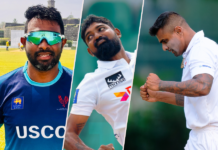
The distance between Dhanushkodi in Tamil Nadu and Talaimannar in Sri Lanka is less than 30 kilometres. For many people living in Delhi or Mumbai, that is a distance they commute every day from home to work. And yet, something happens in this small stretch of sea, so short that it’s not even enough for a border at sea to be established by International Maritime Law, that transports you to whole new world.
[rev_slider LOLC]
Sri Lanka is so similar to parts of India in so many ways, it sometimes feels odd that it is a different country. Yet the stark differences hit you in the most pleasant way. Middle-class Sri Lankans do not think it is acceptable to urinate on the streets. Drivers in Sri Lanka stop at a zebra crossing to allow pedestrians to cross. And cricketers in Sri Lanka? They stand up for themselves and their people and speak out when the occasion demands it.
The violence in Kandy forced the government to declare a state of emergency, something that sounds a lot more dire than it is, in Colombo. And without being asked Kumar Sangakkara, a Kandyan, took to Twitter. “No one in Sri Lanka can be marginalised or threatened or harmed due to their ethnicity or religion. We are One Country and One people. Love, trust and acceptance should be our common mantra. No place for racism and violence. STOP. Stand together and stand strong.”
Where Kumar walks, Mahela Jayawardene can’t be far behind. Jayawardene posted: “I strongly condemn the recent acts of violence & everyone involved must be brought to justice regardless of race/ religion or ethnicity. I grew up in a civil war which lasted 25 years go through that.”
Sanath Jayasuriya, as always, was more bullish: “Disgusting and sickening to see the acts of violence in Sri Lanka. I condemn strongly and to bring the involved culprits to justice. I request people of Sri Lanka to be wise and stay together in these tough times.”
But, it isn’t only former cricketers. Angelo Mathews, the captain, who is missing the Nidahas Trophy because of injury, weighed in: “We as Sri Lankans suffered enough through a tumultuous three decade War. We lost many a loved one. Hopes and dreams were shattered in an instant. Many including myself and my family walked the streets in fear and uncertainty. I’m sure many of you too could relate to that.”
And if that was not enough, he added: “Yet it seems like certain factions of our Country and Society have learned nothing from the past. Do we really need another ethnic crisis? This Nation is OURS we are one PEOPLE and I condemn these acts of violence and hatred. I urge all of You to unite against racism and take a stand against such people spreading hatred and violence. Let’s protect OUR NATION. Always give first place to Humanity in the name of Sri Lanka.”
If you are one of Sachin Tendulkar’s 26.4 million followers on Twitter, you will have read his birthday wishes to fellow sportsmen, his subtle endorsement of certain products or events, but not one comment on the communal strife that is taking a grip in swathes of India. If you follow Virat Kohli, as do 23.5 million others, you will that his latest post is plugging Uber, an app-based taxi service that is a multi-billion dollar global company. What you will not see is a word on statues being brought down, farmers committing suicide or businessmen fleeing the country. If you follow Virender Sehwag, the third most popular Indian cricketer on social media, you get a steady dose of rustic humour and the occasional serious lapse in judgment, when Sehwag is at the wheel, and the rest of the time commercial plugs that the company managing his account puts out.
It is an irrefutable fact that the life of an Indian cricketer in public is not an easy one. It is an irrefutable fact that Sri Lanka’s cricketers do not face the kind of day-to-day pressures that India’s biggest stars have to endure.
But, if you do not use your undeniable influence, and social media to actually promote social causes, are you really the big star? Sri Lanka’s cricketers come from a small island with a small market but their hearts are bigger than their colleagues from other parts of the world.













